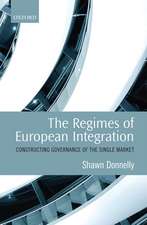EU Cohesion Policy and European Integration: The Dynamics of EU Budget and Regional Policy Reform
Autor John Bachtler, Carlos Mendezen Limba Engleză Hardback – 17 dec 2013
Preț: 1009.74 lei
Preț vechi: 1231.39 lei
-18% Nou
Puncte Express: 1515
Preț estimativ în valută:
193.21€ • 202.27$ • 159.87£
193.21€ • 202.27$ • 159.87£
Carte tipărită la comandă
Livrare economică 07-21 aprilie
Preluare comenzi: 021 569.72.76
Specificații
ISBN-13: 9780754674214
ISBN-10: 0754674215
Pagini: 336
Dimensiuni: 156 x 234 x 21 mm
Greutate: 0.73 kg
Ediția:Revised edition
Editura: Taylor & Francis
Colecția Routledge
Locul publicării:Oxford, United Kingdom
ISBN-10: 0754674215
Pagini: 336
Dimensiuni: 156 x 234 x 21 mm
Greutate: 0.73 kg
Ediția:Revised edition
Editura: Taylor & Francis
Colecția Routledge
Locul publicării:Oxford, United Kingdom
Recenzii
’This book distils the knowledge, experience and policy expertise of academics at the leading centre for research on European cohesion policy, providing a rich and thoughtful guide to the complexities of one of the EU’s flagship policies.’ Iain Begg, European Institute, London School of Economics, UK ’This excellent book provides fascinating and important new insights into the evolution of EU cohesion policy. It adds considerable detail and nuance to the view that it is just another battleground for member states fighting over EU spending. It is essential reading for anyone interested in EU policies and policy processes.’ Rob Ackrill, Nottingham Trent University, UK 'For students of EU politics, post-graduate researchers, civil servants and policy-making officials in local government and other supplicants at the doors of the Brussels glass palaces, this volume will make valuable reading. It presents long-term research in an accessible format and, where necessary, utilises theoretical concepts to assist in grasping the complexities of one of the EU’s flagship policies.' Journal of Contemporary European Studies
Notă biografică
John Bachtler, University of Strathclyde, UK, Carlos Mendez, University of Strathclyde, UK and Fiona Wishlade, University of Strathclyde, UK.
Cuprins
I: The Theoretical and Policy Context; 1: Introduction: Analysing the Reform of EU Cohesion Policy; 2: Understanding EU Cohesion Policy; 3: The European Regional Development Fund: A Political History, 1958–1985; 4: The Institutionalisation of EU Cohesion Policy: From the Single European Act to Agenda 2000; 5: Budgetary Politics: How Much, Who Pays and Who Gains?; 6: From Doubling to Capping: Cohesion Policy Allocations 1989–1999; II: Pressures for Reform; 7: EU Enlargement and Cohesion Policy; 8: The Added Value of Cohesion Policy; III: Reform Proposals, Interests and Negotiations; 9: Preparing the Ground for Reform: The European Commission's Proposals; 10: National Interests in Cohesion Policy and the Positions of Member States; 11: Charting the Negotiations on the Reform of Cohesion Policy; 12: Negotiating the Legislative Package; IV: Conclusions and Policy Implications; 13: Conclusions: The Past, Present and Future of Cohesion Policy
Descriere
This book provides a comprehensive and theoretically-informed analysis of how Cohesion policy has evolved over time, in particular the budgetary and policy dynamics of the 2007-13 reform. In the context of the budgetary politics of the EU, the book examines the process by which the reform of Cohesion policy has been shaped; it identifies the key factors that explain the allocation of funding, assesses the roles of the Member States, European Commission and European Parliament, and tests whether the process and outcome are consistent with the expectations of EU decision-making and integration theories. Based on extensive, EU-wide research over a ten-year period, the book provides new insights into both the process and outcomes of EU policy reform.














